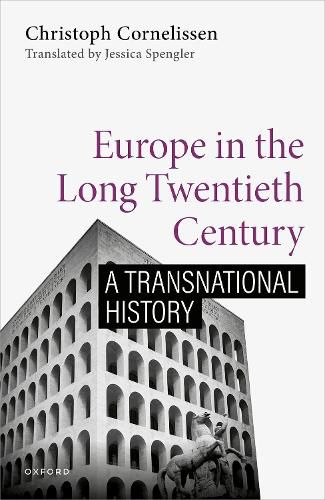Readings Newsletter
Become a Readings Member to make your shopping experience even easier.
Sign in or sign up for free!
You’re not far away from qualifying for FREE standard shipping within Australia
You’ve qualified for FREE standard shipping within Australia
The cart is loading…






Thanks to their economic and military strength, the European empires had achieved global supremacy by 1900, with large parts of the world under their dominance in the wake of colonial expansion. This situation fuelled ideas of Europe's permanent, almost natural global superiority, especially among the middle classes. However, as early as the First World War, such claims came under increasing pressure. This volume explains the role played by modern nationalism and anti-imperial movements, the competition between different political orders, changes in the economy and society, and the great ideas and utopias. Their interplay gave rise to enormously destructive forces in Europe. From the Boer and Balkan wars before 1914 to the Yugoslav wars of the 1990s and the Ukraine war since 2022, they have produced a continuum of violence. At the same time, the great promise of political participation and social security is one of the constants of Europe's history in the long twentieth century. Against this backdrop, modern societies emerged whose values had moved far away from the older models. Perceptions of the role of the sexes, families, and generations changed fundamentally. In addition, the major internal European migrations, together with the global immigration that became increasingly significant after 1945, ensured that the ethnic profile of European societies changed considerably. Europe in the Long Twentieth Century shows how, on the one hand, these different factors led to a Europeanisation of living and working conditions and, at the same time, how the political and economic integration of the countries of Europe progressed. On the other hand, it demonstrates how Europe's role in the global context changed fundamentally. As much as the geopolitical provincialisation of Europe continued unabated, Europeans were constantly searching for new ways to assert themselves throughout the long twentieth century. The search continues.
$9.00 standard shipping within Australia
FREE standard shipping within Australia for orders over $100.00
Express & International shipping calculated at checkout
Thanks to their economic and military strength, the European empires had achieved global supremacy by 1900, with large parts of the world under their dominance in the wake of colonial expansion. This situation fuelled ideas of Europe's permanent, almost natural global superiority, especially among the middle classes. However, as early as the First World War, such claims came under increasing pressure. This volume explains the role played by modern nationalism and anti-imperial movements, the competition between different political orders, changes in the economy and society, and the great ideas and utopias. Their interplay gave rise to enormously destructive forces in Europe. From the Boer and Balkan wars before 1914 to the Yugoslav wars of the 1990s and the Ukraine war since 2022, they have produced a continuum of violence. At the same time, the great promise of political participation and social security is one of the constants of Europe's history in the long twentieth century. Against this backdrop, modern societies emerged whose values had moved far away from the older models. Perceptions of the role of the sexes, families, and generations changed fundamentally. In addition, the major internal European migrations, together with the global immigration that became increasingly significant after 1945, ensured that the ethnic profile of European societies changed considerably. Europe in the Long Twentieth Century shows how, on the one hand, these different factors led to a Europeanisation of living and working conditions and, at the same time, how the political and economic integration of the countries of Europe progressed. On the other hand, it demonstrates how Europe's role in the global context changed fundamentally. As much as the geopolitical provincialisation of Europe continued unabated, Europeans were constantly searching for new ways to assert themselves throughout the long twentieth century. The search continues.